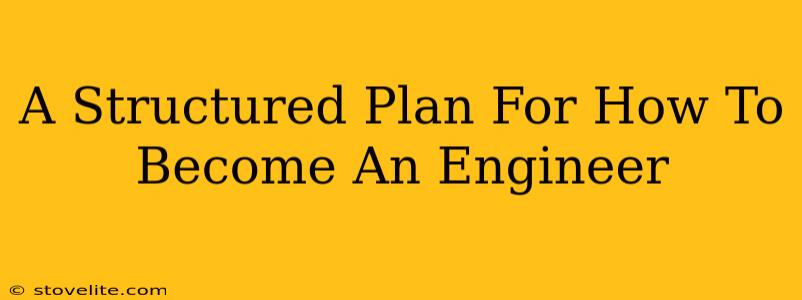So, you want to become an engineer? That's fantastic! Engineering is a rewarding field offering diverse career paths and the chance to make a real impact on the world. But the journey requires planning and dedication. This structured plan will guide you through the process, from choosing a specialization to landing your first engineering job.
Step 1: Choosing Your Engineering Niche
The first hurdle? Deciding which type of engineer you want to be. There's a vast landscape of options, each with its own unique challenges and rewards. Here are a few popular choices to get you started:
- Chemical Engineering: Focuses on designing and operating chemical plants, refining processes, and developing new materials.
- Civil Engineering: Involves designing and constructing infrastructure like bridges, roads, and buildings.
- Electrical Engineering: Deals with the design and development of electrical systems, circuits, and electronic devices.
- Mechanical Engineering: A broad field encompassing the design, manufacturing, and operation of mechanical systems.
- Software Engineering: Focuses on the design, development, and maintenance of software applications.
Consider your interests and strengths: Are you fascinated by chemistry? Do you love problem-solving and design? Do you thrive in a collaborative environment? Reflecting on these questions will help you narrow down your options. Research different specializations thoroughly. Look at job descriptions and talk to practicing engineers to get a better understanding of the day-to-day realities of each field.
Step 2: Academic Preparation: The Educational Path
Once you’ve chosen a specialization, it's time to focus on your education. Becoming an engineer typically requires a strong foundation in mathematics and science.
High School:
- Excel in Math and Science: Focus on courses like algebra, calculus, physics, and chemistry. These form the bedrock of most engineering disciplines.
- Develop Strong Study Habits: Engineering requires discipline and consistent effort. Develop good study habits early on.
- Explore STEM Activities: Participate in science fairs, robotics clubs, or coding competitions. This will give you a taste of what engineering is like and help build your resume.
Higher Education:
- Earn a Bachelor's Degree: A four-year bachelor's degree in your chosen engineering discipline is essential. Look for accredited programs from reputable universities.
- Consider Internships: Internships provide valuable real-world experience and networking opportunities. They are highly recommended and often a requirement for graduation in some programs.
- Further Education (Optional): A master's degree or even a PhD can enhance your career prospects and open doors to more specialized roles and research opportunities.
Step 3: Gaining Practical Experience
Theory is crucial, but practical experience is just as important. Supplement your academic studies with:
- Internships: As mentioned before, these are invaluable.
- Part-Time Jobs: Even related part-time jobs can be beneficial.
- Personal Projects: Working on personal projects demonstrates initiative and passion. Building a portfolio of projects is a great way to showcase your skills.
- Networking: Attend industry events, join professional organizations, and connect with engineers on LinkedIn.
Step 4: Licensing and Certification (Depending on Your Specialization)
Some engineering disciplines require professional licensure. This usually involves passing a Fundamentals of Engineering (FE) exam and, after gaining experience, a Professional Engineering (PE) exam. Check the licensing requirements specific to your chosen field.
Step 5: The Job Search
Landing that first engineering job can feel daunting, but with preparation, you'll increase your chances.
- Build a Strong Resume and Cover Letter: Tailor these to each specific job application, highlighting relevant skills and experiences.
- Prepare for Interviews: Practice your interviewing skills and research the companies you're applying to.
- Network: Networking can often lead to unadvertised job opportunities.
Becoming an engineer is a journey that requires dedication and hard work. But with a structured plan, a passion for your chosen field, and a commitment to continuous learning, you can achieve your goal and embark on a rewarding career. Remember to stay curious, keep learning, and embrace the challenges along the way. Good luck!

